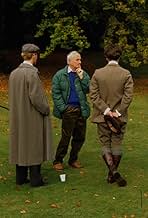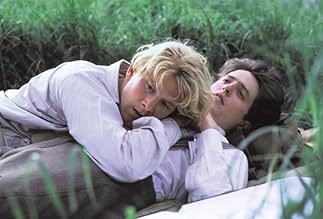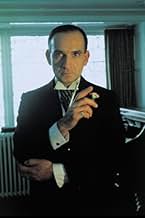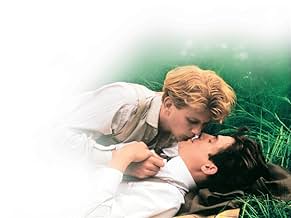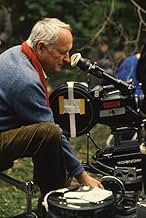अपने प्रेमी द्वारा उसे अस्वीकार करने के बाद, एडवर्डियन समाज की दमनकारीता से फंसा एक युवक आने की कोशिश करता है।अपने प्रेमी द्वारा उसे अस्वीकार करने के बाद, एडवर्डियन समाज की दमनकारीता से फंसा एक युवक आने की कोशिश करता है।अपने प्रेमी द्वारा उसे अस्वीकार करने के बाद, एडवर्डियन समाज की दमनकारीता से फंसा एक युवक आने की कोशिश करता है।
- निर्देशक
- लेखक
- स्टार
- 1 ऑस्कर के लिए नामांकित
- 3 जीत और कुल 2 नामांकन
फ़ीचर्ड समीक्षाएं
"Maurice" (prononced "Morris") is the film adaption of the book by E.M. Forster and stated to be semi-autobiographical of his life. The book was banned for many years and it wasn't until 1987 that this visually splendid film was released from Merchant-Ivory - ("A Room With A View", "Howard's End"). Set in early 19th century England, it details the coming of age story of Maurice Hall, an upper-class aristocrat who falls in love with fellow classmate Clive Durham (Hugh Grant). Shortly after their romance begins, a fellow student is entrapped and imprisoned for soliciting a military officer. Out of fear of losing his inheritance and political future, Clive decides to get married. Although hurt and feeling very alone, Maurice continues a close platonic relationship with Clive. After attempts to "cure" his homosexuality fail, Maurice finds himself falling in love with Clive's gamekeeper, Scudder. With the threat of exposure and blackmail always a real possibility, they must risk everything to build a future together. Supporting performances by Denholm Elliot, Helena Bonham Carter and Ben Kingsley help make this a true classic. The lush and elegant score is available as part a 3-disc set of Merchant-Ivory film scores. Guys, if you're looking for a great "first-date" video, it really doesn't get much better than "Maurice"!
I remember I saw this movie I was about 17. I'd read the book and fell in love. It tells a love story between two men and the way they have to carry it out despite society rules (with some changes it still happens nowadays...).
The general message would be "love conquers all" but is it really so? Are Maurice and Scudder able to live happily ever after? I doubt, and on the beginning of the XXth century it would be even worse.
Despite all, it's lovely to watch the same kind of story we're used to watching in movies that portray society in different times, but now speaking about love between men! Although James Ivory's work is beyond criticism, in my point a view, there were some scenes in the book (the one when they are in London, sitting naked by the fire, for instance) that really should be in the movie.
But it's a tender and romantic approach of of book (only published after E.M. Foster's death) that surely would have pleased it's author.
The general message would be "love conquers all" but is it really so? Are Maurice and Scudder able to live happily ever after? I doubt, and on the beginning of the XXth century it would be even worse.
Despite all, it's lovely to watch the same kind of story we're used to watching in movies that portray society in different times, but now speaking about love between men! Although James Ivory's work is beyond criticism, in my point a view, there were some scenes in the book (the one when they are in London, sitting naked by the fire, for instance) that really should be in the movie.
But it's a tender and romantic approach of of book (only published after E.M. Foster's death) that surely would have pleased it's author.
Similar to goldilocks-78, I watched Maurice again - I saw it when I was in my 20s, when it was first released. There is some very good acting, and a very good sociological recreation of the Edwardian period. Maurice, the novel, might well not be considered as EM Forster's finest work. But similar to Lady Chatterley's Lover (not considered among Lawrence's best), the work raises issues of class, gender, and sexuality. The three leads are good - Hugh Grant gives a plausible portrayal of a more refined, upper-class man, who denies his homosexual urgings and marries. He clearly shows (after this conversion of sorts) his ambivalence and almost forced denial. Hugh Grant, almost effortlessly, shows the two sides to this character. James Wilby,as Maurice, moves from self-disgust, despair and guilt, to self-acceptance. Rupert Graves as Scudder (similar to Mellors) is really good. The scenes he shares with James Wilby are not forced. The supporting cast are good - the women, Simon Callow (who introduces us to the Edwardian conformist ideology) are equally good. And Ben Kingsley, as the hypnotherapist nicely shows the push-pull in the then-British psyche. My favourite Merchant-Ivory film is Room with a view. Maurice is darker, but just as well filmed, with enough humour to balance the seriousness of the film. The naive, happily-ever-after ending (EM Forster's) doesn't quite work, but leads to good discussion. Of all the DVD-shown deleted scenes, the final 'confrontation' between Maurice and Durham should be, in my opinion, restored. It's a fine film, both engaging and unsettling. Sensitively adapted, directed, acted and shot. Kudos
Many viewers and critics have criticised the happy ending of this film as being 'unrealistic' or even 'impossible'. After all an upper class and working class man could never live as a couple in Edwardian England? In fact E.M. Forster's inspiration for writing the book Maurice was a real gay couple, one upper class and the other working class, who lived together openly in England for about 35 years until 1928. They are buried in the same grave.
Edward Carpenter was a close friend of E.M.Forster, who named Carpenter's working class gay partner, George Merrill, as the inspiration for his novel Maurice. He had visited Carpenter and Merrill at Millthorpe in Derbyshire on several occasions: once, in 1913, Merrill "touched my backside - gently and just above the buttocks. I believe he touched most people's. The sensation was unusual and I still remember it, as I remember the position of a long vanished tooth. He made a profound impression on me and touched a creative spring" That was the origin for the writing of Maurice.
Edward Carpenter was a close friend of E.M.Forster, who named Carpenter's working class gay partner, George Merrill, as the inspiration for his novel Maurice. He had visited Carpenter and Merrill at Millthorpe in Derbyshire on several occasions: once, in 1913, Merrill "touched my backside - gently and just above the buttocks. I believe he touched most people's. The sensation was unusual and I still remember it, as I remember the position of a long vanished tooth. He made a profound impression on me and touched a creative spring" That was the origin for the writing of Maurice.
I ran into this movie a long, long time ago, watching the TV news one evening back in 1987. I felt as I couldn't miss it as soon as I realized it had been shot in Cambridge, my favorite place in the world, but all my feelings went much beyond that when I saw it. I didn't feel uneasy about homosexuality at all but it was with that movie that I finally realized it was only love, no matter whether it involved a man and a woman, or two men, or two women.... The set is magnificent, the actors at their best (a great Hugh Grant who was so great as to show how Mr E.M.Forster had become tired with Clive...), and I must say that Mr Ivory did a pretty good job with his version of the story, very well adapted. In fact I do believe the book is superior in many moments but, on the other hand, the film is far far superior in many other moments, and you can't really say this all the times. I suggest everybody should watch it and enjoy it, no matter what your sexual preferences are. A masterpiece, indeed!
क्या आपको पता है
- ट्रिवियाIn the DVD extras, Hugh Grant says that because he and James Wilby already knew each other from appearing in Privileged (1982) together, they were able to practice their scenes together at Grant's house the night before Wilby's audition. Grant says that he remembers it "being a surprise to my banker brother when he came home and found me kissing James Wilby in the front room."
- गूफ़During one of the earlier scenes while Maurice and others are reading/translating with a professor/dean, Maurice is seen clearly wearing a wristwatch. While wristwatches did exist at the time they were rare, and were considered working class so would not have been worn by a gentleman. The wristwatch would not become common until the first world war, when they were given to soldiers to allow them to see the time while both hands were engaged.
- भाव
Maurice Hall: I'm an unspeakable of the Oscar Wilde sort.
- इसके अलावा अन्य वर्जनSome NTSC versions are scanned at 25fps and the running time is short and seems edited but the movie is intact.
- साउंडट्रैकMiserere Psalm 51
Written by Gregorio Allegri
Sung by The Choir of Kings College Cambridge
Courtesy of The Decca Record Company LTD.
टॉप पसंद
रेटिंग देने के लिए साइन-इन करें और वैयक्तिकृत सुझावों के लिए वॉचलिस्ट करें
- How long is Maurice?Alexa द्वारा संचालित
विवरण
- रिलीज़ की तारीख़
- कंट्री ऑफ़ ओरिजिन
- आधिकारिक साइटें
- भाषा
- इस रूप में भी जाना जाता है
- Moris
- फ़िल्माने की जगहें
- उत्पादन कंपनियां
- IMDbPro पर और कंपनी क्रेडिट देखें
बॉक्स ऑफ़िस
- बजट
- £15,77,000(अनुमानित)
- US और कनाडा में सकल
- $24,84,230
- US और कनाडा में पहले सप्ताह में कुल कमाई
- $49,278
- 20 सित॰ 1987
- दुनिया भर में सकल
- $26,43,324
- चलने की अवधि2 घंटे 20 मिनट
- ध्वनि मिश्रण
- पक्ष अनुपात
- 1.66 : 1
इस पेज में योगदान दें
किसी बदलाव का सुझाव दें या अनुपलब्ध कॉन्टेंट जोड़ें



